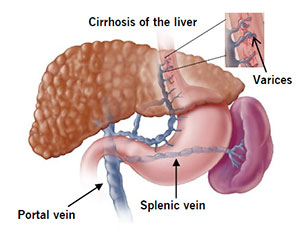- Home
- Editorial
- News
- Practice Guidelines
- Anesthesiology Guidelines
- Cancer Guidelines
- Cardiac Sciences Guidelines
- Critical Care Guidelines
- Dentistry Guidelines
- Dermatology Guidelines
- Diabetes and Endo Guidelines
- Diagnostics Guidelines
- ENT Guidelines
- Featured Practice Guidelines
- Gastroenterology Guidelines
- Geriatrics Guidelines
- Medicine Guidelines
- Nephrology Guidelines
- Neurosciences Guidelines
- Obs and Gynae Guidelines
- Ophthalmology Guidelines
- Orthopaedics Guidelines
- Paediatrics Guidelines
- Psychiatry Guidelines
- Pulmonology Guidelines
- Radiology Guidelines
- Surgery Guidelines
- Urology Guidelines
Beta blockers reduce bleeding and mortality risk in Cirrhosis

Scientists in a systematic review and meta‐analysis have found that Beta-blockers are a safe and effective alternative to variceal band ligation for reducing Cirrhosis related variceal bleeding and mortality risk.
Treatment with nonselective beta‐blockers (NSBB) may decrease all-cause mortality and the risk of first variceal bleeding in cirrhosis patients with large oesophagal varices and no prior history of bleeding reports a study published in the journal Hepatology.
Oesophagal varices are abnormal, enlarged veins in the tube that connects the throat and stomach (oesophagus). This condition occurs most often in people with serious liver diseases. Oesophagal varices develop when normal blood flow to the liver is blocked by a clot or scar tissue in the liver.
Mayank Sharma and associates performed a systematic review with network meta‐analysis (NMA) to compare the efficacy of different approaches in the primary prevention of oesophagal variceal bleeding and overall survival in cirrhotic patients with large varices.
The meta-analysis included thirty‐two randomized clinical trials (RCT) with 3362 cirrhotic adults with large oesophagal varices and no prior history of bleeding, with minimum 12m follow‐up.
Nonselective beta-blockers (NSBB), isosorbide mononitrate (ISMN), carvedilol and variceal band ligation (VBL), alone or in combination, were compared to each other or placebo.
Primary outcomes were the reduction of all‐cause mortality and prevention of oesophagal variceal bleeding.
Key study findings:
- Moderate quality evidence supports NSBB monotherapy or in combination with variceal band ligation VBL for decreasing mortality in cirrhotic patients with large esophageal varices and no prior history of bleeding.
- Moderate quality evidence supports carvedilol and VBL monotherapy or in combination with NSBB, and low-quality evidence supports NSBB monotherapy for primary prevention of variceal bleeding.
- VBL , variceal band ligation carried a higher risk of serious adverse events compared to NSBB, nonselective beta‐blockers.
The study concluded that nonselective beta‐blockers(NSBB) carry a lower risk of serious complications compared to VBL, so, NSBB may be the preferred initial approach for primary prophylaxis of esophageal variceal bleeding.
For reference log on to https://doi.org/10.1002/hep.30220

Disclaimer: This site is primarily intended for healthcare professionals. Any content/information on this website does not replace the advice of medical and/or health professionals and should not be construed as medical/diagnostic advice/endorsement or prescription. Use of this site is subject to our terms of use, privacy policy, advertisement policy. © 2020 Minerva Medical Treatment Pvt Ltd